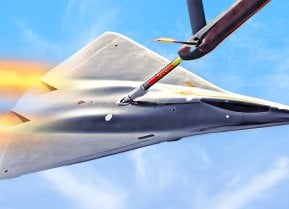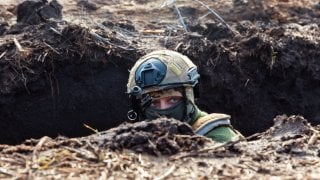Ukraine’s Kursk Offensive Has Revealed Russia's Military Weakness
The daring attack has shown that Russia is actually unwilling to escalate, contrary to conventional wisdom.
Over the past two weeks, Ukraine has taken its fight with the Kremlin onto Russian soil. Kyiv’s offensive consisted of a daring raid into Russia’s Kursk region designed to bring the fight to Russian forces and draw the Kremlin’s combat troops away from its own territory.
Aside from a few headlines, though, Ukraine’s bold strategic gamble has gone largely unnoticed. That’s a shame because Kyiv’s initiative—and Moscow’s response to it—has made clear that persistent Western fears of Russian brinkmanship are overblown.
Up until now, both U.S. and European policies have been defined by caution and fear of Russian risk-taking. While President Biden has pledged to back Kyiv’s fight for “as long as it takes,” in practice, his administration has been slow to provide Ukraine with the weaponry it needs to win the fight decisively. And even when it has, that aid has been accompanied by onerous restrictions that have had the effect of limiting Ukraine’s fighting potential. European nations, meanwhile, have taken their cues from Washington and settled in for a long campaign of incremental assistance to Ukraine. The result has been a situation that—at least until recently—had settled into a strategic stalemate and positional warfare.
That’s the equation Ukraine’s push into Russia is attempting to alter. In the process, however, it has also laid bare the hollowness of Moscow’s threats of strategic escalation in response to battlefield setbacks.
Ever since the current conflict broke out in February 2022, the West has been concerned that “poking the bear” could prompt Russia to use nuclear weapons and escalate the war into a full-blown showdown with NATO. But Ukraine’s push north, through which it has managed to seize over 480 square miles of Russia’s Kursk Oblast, hasn’t elicited much of a response from Russia. To be sure, the Kremlin has mobilized in response, declaring a federal emergency in the region and redeploying troops, tanks, and artillery from the Ukraine front to (so far unsuccessfully) beat back the invaders. However, what Russia has not done is retaliate against Ukraine or its partners with any significant escalatory measures.
President Vladimir Putin has not ramped up the conflict in conventional terms. Nor has he used nuclear weapons against Russia’s western neighbor, as Russian officials have threatened in the past. Indeed, even with Ukrainian troops now entrenched in Russian territory, the Kremlin hasn’t made any maneuvers that could threaten to escalate the conflict further.
Part of the reason for Russia’s restraint is no doubt practical. Simply put, Moscow is already using pretty much all the military resources at its disposal in its attempts to subjugate Ukraine. As such, Russia is unlikely to make moves so provocative that they might prompt the direct involvement of NATO. Indeed, there does not seem to be much that Russia might be able to do to turn the tables on Kyiv without risking the alliance entering the conflict.
The lesson is worth heeding. As dominant as Russia’s strongman wants to appear, his government is in a far more precarious position than the West originally believed. Putin’s bluff has always been that he would be more willing to turn up the heat if the war doesn’t go his way. But the reality is that he cannot. All of Russia’s tanks, artillery, aircraft, missiles, and ships are as committed as they can be without exposing Russia to other attacks. And because they are, there are real-world limits to what Russia can realistically do to punish the West.
Ukraine’s daring offensive, in other words, has laid bare a couple of critical truths. The first is that Russia is weak and constrained by the same sort of real-world limitations that afflict other powers. The second is that Ukraine, though embattled, can still find ways to break the stalemate and win this war.
About the Author:
Elliot Petroff is a researcher at the American Foreign Policy Council in Washington, DC.
Image: Shutterstock.com.


